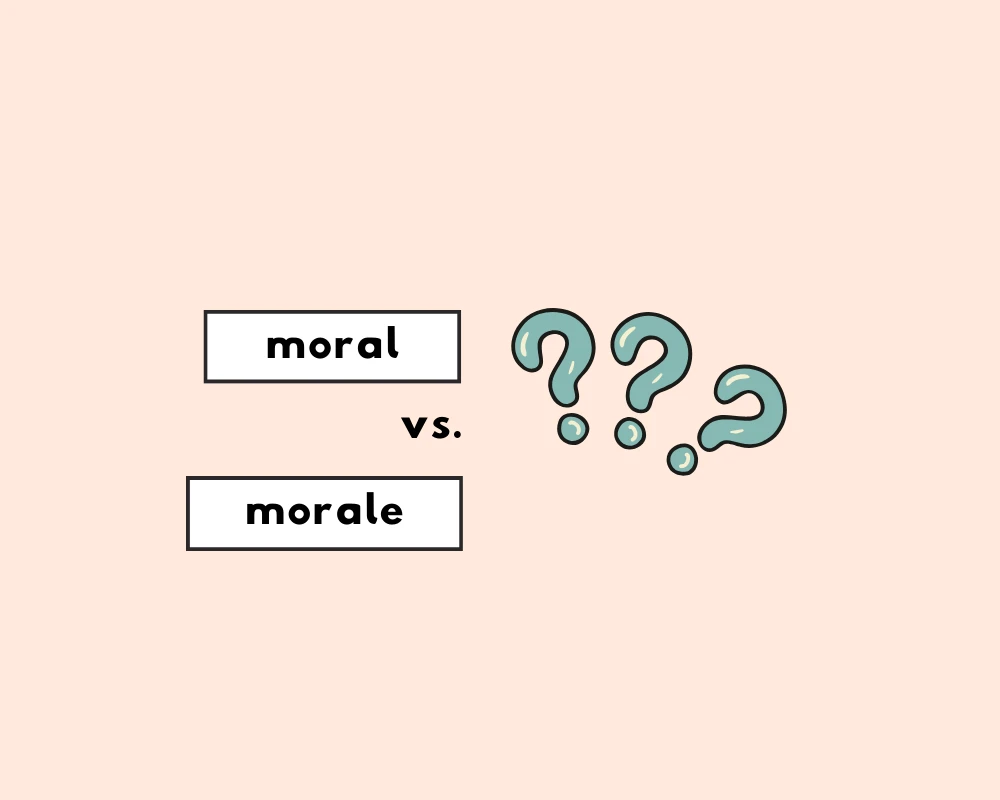Moral and morale sound nearly the same, and are only a single letter apart. Still, they are not the same. Use these words accordingly.
The team’s morale is high after the victory.
It is moral to help those in need.
His moral was boosted by the good news.
The company needs to improve employee moral.
- Morale (noun) refers to “the amount of confidence and enthusiasm, etc. that a person or a group has at a particular time”.
- Moral is mainly an adjective, and describes being “connected with principles of right and wrong behaviour”. In its noun form, morals refers to “standards or principles of good behaviour”.
“Morale” / “Moral”, used in sentences
| Examples: “morale”, used in sentences |
|---|
| Morale amongst the players is very high at the moment.
Staff are suffering from low morale. Another win would be good for the team’s morale. |
| Examples: “moral”, used in sentences as a noun |
|---|
| Young people these days have no morals.
The play was considered an affront to public morals. The question is one of manners rather than morals. |
| Examples: “moral”, as an adjective |
|---|
| The basic moral philosophies of most world religions are remarkably similar.
He was a deeply religious man with a highly developed moral sense. The newspapers were full of moral outrage at the weakness of other countries. |
Morale, synonyms
- attitude
- mood
- resolve
- self-confidence
- spirit
“moral” vs. “morale,” associate “morale” with “moral” *plus* an “e” for “enthusiasm”—high morale means high enthusiasm.
Moral, synonyms
- ethical
- good
- honest
- noble
- principled
- proper
- righteous
Word origin (of morale/moral)
|
Mid-14c., “associated with or characterized by right behavior,” also “associated with or concerning conduct or moral principles” (good or bad), from Old French moral (14c.) and directly from Latin moralis “proper behavior of a person in society”. |
Read about other misused words
Worksheet
According to the post, what does the word “morale” primarily refer to?
In the sentence “It is _____ to help those in need,” which word correctly fills the blank according to the post’s examples?
Which word is described in the post as mainly functioning as an adjective?
The post identifies a common mistake as using which word when “morale” is needed?
According to the study tip, associating “morale” with “enthusiasm” uses which letter as a memory aid?
The newspaper article discussed the implications of the new policy.
After winning the championship, the team’s was extremely high.
Some people believe that public are declining.
The company is implementing new programs to improve employee .
He has a strong sense and always tries to do what is right.
FAQs
What does morale mean?
+
What does moral mean (adjective)?
+
How is “moral” used as a noun?
+
What is a common mistake with these words?
+
How can I remember the difference?
+
Yash, D. "Moral vs. Morale (Meaning + Usage)." Grammarflex, Jun 25, 2025, https://www.grammarflex.com/moral-vs-morale-meaning-usage/.
Sources
-
Oxford Learner’s Dictionary on “morale” and “moral”. Accessed 22 March 2024.










